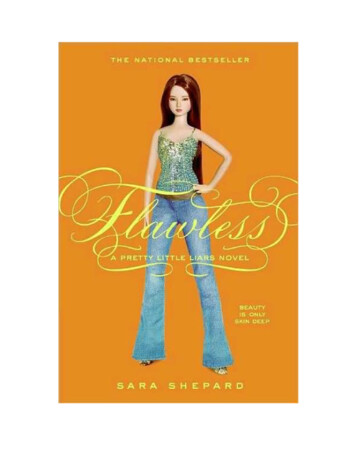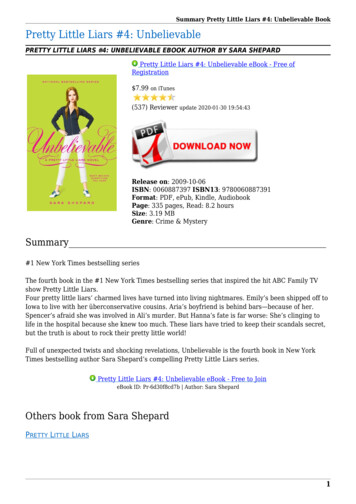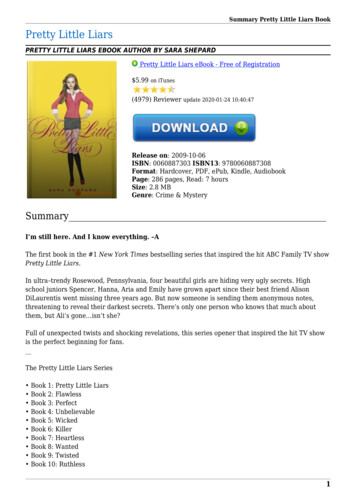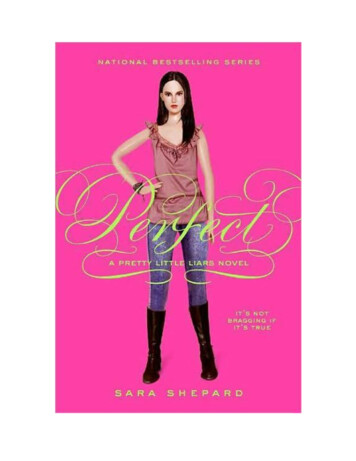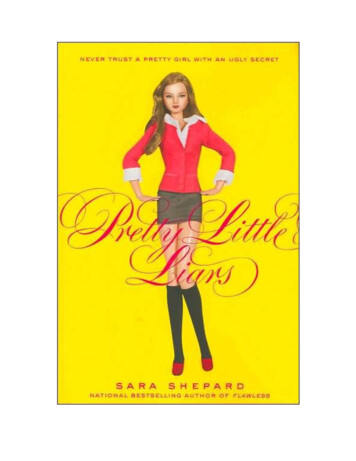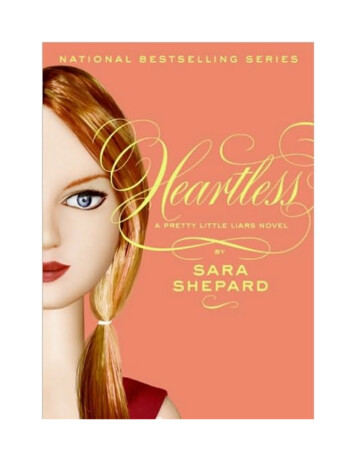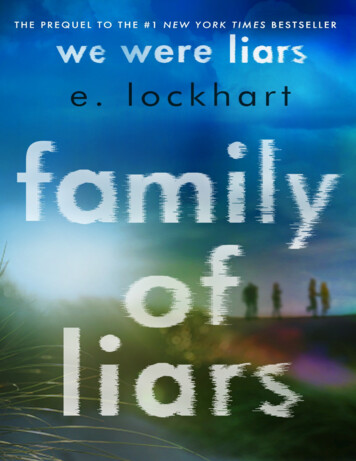
Transcription
Also by e. lockhar tWe Were LiarsGenuine FraudAgain AgainFly on the WallDramaramaThe Disreputable History of Frankie Landau-BanksWhistle: A New Gotham City HeroThe Ruby Oliver Quar tetThe Boyfriend ListThe Boy BookThe Treasure Map of BoysReal Live Boyfriends
This is a work of fiction. Names, characters, places, and incidents either are the product of theauthor’s imagination or are used fictitiously. Any resemblance to actual persons, living or dead,events, or locales is entirely coincidental.Text copyright 2022 by Lockhart InkCover art used under license from Getty Images and Shutterstock.comAll rights reserved. Published in the United States by Delacorte Press, an imprint of Random HouseChildren’s Books, a division of Penguin Random House LLC, New York.Delacorte Press is a registered trademark and the colophon is a trademark of Penguin Random HouseLLC.Visit us on the Web! GetUnderlined.comEducators and librarians, for a variety of teaching tools, visit us at RHTeachersLibrarians.comLibrary of Congress Cataloging-in-Publication Data is available upon request.ISBN 978-0-593-48585-9 (hc) — ISBN 978-0-593-48586-6 (lib. bdg.) — ISBN 978-0-593-48587-3(ebook) — ISBN 978-0-593-56853-8 (int’l ed.)Random House Children’s Books supports the First Amendment and celebrates the right to read.Penguin Random House LLC supports copyright. Copyright fuels creativity, encourages diversevoices, promotes free speech, and creates a vibrant culture. Thank you for buying an authorizededition of this book and for complying with copyright laws by not reproducing, scanning, ordistributing any part in any form without permission. You are supporting writers and allowingPenguin Random House to publish books for every reader.ep prh 6.0 139875643 c0 r0
For Hazel
ContentsCoverAlso by E. LockhartTitle PageCopyrightDedicationGenealogyMapDear ReadersPart One: A Story for JohnnyChapter 1Part Two: Four SistersChapter 2Chapter 3Chapter 4Chapter 5Chapter 6Part Three: The Black PearlsChapter 7Chapter 8Chapter 9Chapter 10Chapter 11Chapter 12
Chapter 13Chapter 14Part Four: The BoysChapter 15Chapter 16Chapter 17Chapter 18Chapter 19Chapter 20Chapter 21Chapter 22Chapter 23Chapter 24Chapter 25Chapter 26Chapter 27Chapter 28Chapter 29Chapter 30Chapter 31Chapter 32Chapter 33Chapter 34Chapter 35Chapter 36Chapter 37Chapter 38
Chapter 39Chapter 40Chapter 41Chapter 42Chapter 43Part Five: Mr. FoxChapter 44Chapter 45Chapter 46Chapter 47Chapter 48Chapter 49Chapter 50Chapter 51Chapter 52Chapter 53Part Six: A Long Boat RideChapter 54Chapter 55Chapter 56Chapter 57Chapter 58Chapter 59Chapter 60Chapter 61Chapter 62
Chapter 63Chapter 64Chapter 65Chapter 66Chapter 67Chapter 68Chapter 69Chapter 70Chapter 71Part Seven: The BonfireChapter 72Chapter 73Chapter 74Chapter 75Chapter 76Chapter 77Chapter 78Chapter 79Chapter 80Part Eight: AfterChapter 81Chapter 82Chapter 83AcknowledgmentsAbout the Author
Dear Readers,This book contains spoilers for the novel We Were Liars.I love you, and I wrote this for you—with ambition andblack coffee.xoE
PART ONEA Stor y for Johnny
1.is dead.Jonathan Sinclair Dennis, that was his name. He died at age fifteen.There was a fire and I love him and I wronged him and I miss him. Hewill never grow taller, never find a partner, never train for another race,never go to Italy like he wanted, never ride the kind of roller coaster thatflips you upside down. Never, never, never. Never anything.Still, he visits my kitchen on Beechwood Island quite often.I see him late at night when I can’t sleep and come down for a glass ofwhiskey. He looks just like he always did at fifteen. His blond hair sticksup, tufty. He has a sunburn across his nose. His nails are bitten down andhe’s usually in board shorts and a hoodie. Sometimes he wears his bluechecked windbreaker, since the house runs cold.I let him drink whiskey because he’s dead anyway. How’s it going tohurt him? But often he wants hot cocoa instead. The ghost of Johnny likesto sit on the counter, banging his bare feet against the lower cabinets. Hetakes out the old Scrabble tiles and idly makes phrases on the countertopwhile we talk. Never eat anything bigger than your ass. Don’t take no foran answer. Be a little kinder than you have to be. Stuff like that.He often asks me for stories about our family. “Tell about when youwere teenagers,” he says tonight. “You and Aunt Penny and Aunt Bess.”I don’t like talking about that time. “What do you want to know?”“Whatever. Stuff you got up to. Hijinks. Here on the island.”“It was the same as now. We took the boats out. We swam. Tennis andice cream and suppers cooked on the grill.”“Did you all get along back then?” He means me and my sisters, Pennyand Bess.“To a point.”MY SON JOHNNY
“Did you ever get in trouble?”“No,” I say. Then, “Yes.”“What for?”I shake my head.“Tell me,” he pushes. “What’s the worst thing you did? Come on, spillit.”“No!” I laugh.“Yes! Pretty please? The absolute worst thing you ever did, back then.Tell your poor dead son all the gory details.”“Johnny.”“Oh, it can’t be that bad,” he says. “You have no idea the things I’veseen on television. Way worse than anything you could have done in the1980s.”Johnny haunts me, I think, because he can’t rest without answers. Hekeeps asking about our family, the Sinclair family, because he’s trying tounderstand this island, the people on it, and why we act the way we do. Ourhistory.He wants to know why he died.I owe him this story.“Fine,” I say. “I’ll tell you.”—is Caroline Lennox Taft Sinclair, but people call me Carrie. Iwas born in 1970. This is the story of my seventeenth summer.That was the year the boys all came to stay on Beechwood Island. Andthe year I first saw a ghost.I have never told this particular story to anyone, but I think it is the onethat Johnny needs to hear.Did you ever get in trouble? he asks. Tell me. What’s the worst thingyou did? Come on, spill it The absolute worst thing you ever did, backthen.MY FULL NAME
Telling this story will be painful. In fact, I do not know if I can tell ittruthfully, though I’ll try.I have been a liar all my life, you see.It’s not uncommon in our family.
PART TWOFour Sisters
2.a blur of wintry Boston mornings, my sisters and Ibundled in boots and itchy wool hats. School days in uniforms with thicknavy cardigans and pleated skirts. Afternoons in our tall brick town house,doing homework in front of the fireplace. If I close my eyes, I can tastesweet vanilla pound cake and feel my own sticky fingers. Life was fairytales before bed, flannel pajamas, golden retrievers.There were four of us girls. In the summers, we went to BeechwoodIsland. I remember swimming in the fierce ocean waves with Penny andBess while our mother and baby Rosemary sat on the shore. We caughtjellyfish and crabs and kept them in a blue bucket. Wind and sunlight, smallquarrels, mermaid games and rock collections.Tipper, our mother, threw wonderful parties. She did it because she waslonely. On Beechwood, anyway. We did have guests, and for some years myfather’s brother Dean and his children were there with us, but my motherthrived at charity suppers and long lunches with dear friends. She lovedpeople and was good at loving them. Without many around on the island,she made her own fun, having parties even when we hadn’t anybodyvisiting.When the four of us were little, my parents would take us to Edgartowneach Fourth of July. Edgartown is a seafaring village on the island ofMartha’s Vineyard, all white picket fences. We’d get deep-fried clams withtartar sauce in paper containers and then buy lemonade from a stand in frontof the Old Whaling Church. We’d set up lawn chairs, then eat as we waitedfor the parade. Local businesses had decorated floats. Vintage car collectorsproudly tooted their horns. The island fire stations paraded their oldestengines. A veterans’ band played Sousa marches and my mother wouldMY CHILDHOOD IS
always sing: “Be kind to your fine-feathered friends / For a duck could besomebody’s mother.”We never stayed for the fireworks. Instead, we motored back toBeechwood and ran up from the family boat dock to the real party.Clairmont house’s porch would be decked out in fairy lights and thelarge picnic table on the lawn dressed in blue and white. We’d eat corn onthe cob, hamburgers, watermelon. There would be a cake like an Americanflag, with blueberries and raspberries on top. My mother would havedecorated it herself. Same cake, every year.After supper she’d give us all sparklers. We’d parade along the woodenwalkways of the island—the ones that led from house to house—and sing atthe top of our lungs. “America the Beautiful,” “This Land Is Your Land,”“Be Kind to Your Fine-Feathered Friends.”In the dark, we’d head to the Big Beach. The groundskeeper, Demetriosin those days, would set off fireworks. The family sat on cotton blankets,the adults holding glasses of clinking ice.Anyway. It’s hard to believe I was ever quite so blindly patriotic, andthat my highly educated parents were. Still, the memories stick.—to me that anything was wrong with how I fit into ourfamily until one afternoon when I was fourteen. It was August, 1984.We had been on the island since June, living in Clairmont. The housewas named for the school that Harris, our father, had attended when he wasa boy. Uncle Dean and my cousins lived in Pevensie, named for the familyin the Narnia books. A nanny stayed the summer in Goose Cottage. Thestaff building was for the housekeeper, the groundskeeper, and otheroccasional staff, but only the housekeeper slept there regularly. The othershad homes on the mainland.I had been swimming all morning with my sisters and my cousinYardley. We had eaten tuna sandwiches and celery from the cooler at mymother’s feet. Sleepy from lunch and exercise, I set my head down and putIT NEVER OCCURRED
one hand on Rosemary. She was napping next to me on the blanket, hereight-year-old arms covered in mosquito bites, her legs sandy. Rosemarywas blond, like the rest of us, with tangled waves. Her cheeks were soft andpeach-colored, her limbs skinny and unformed. Freckles; a tendency tosquint; a goofy laugh. Our Rosemary. She was strawberry jam, scabbyknees, and a small hand in mine.I dozed for a bit while my parents talked. They were sitting in lawnchairs beneath a white umbrella, some distance away. I woke whenRosemary rolled onto her side, and I lay there with my eyes closed, feelingher breathe under my arm.“It’s not worth it,” my mother was saying. “It just isn’t.”“She shouldn’t have it hard when we can fix it,” my father answered.“Beauty is something—but it’s not everything. You act like it’severything.”“We’re not talking about beauty. We’re talking about helping a personwho looks weak. She looks foolish.”“Why be so harsh? There’s no need to say that.”“I’m practical.”“You care what people think. We shouldn’t care.”“It’s a common surgery. The doctor is very experienced.”There was the sound of my mother lighting a cigarette. They allsmoked, back then. “You’re not thinking about the time in the hospital,”Tipper argued. “A liquid diet, the swelling, all that. The pain she’s going tosuffer.”Who were they talking about?What surgery? A liquid diet?“She doesn’t chew normally,” said Harris. “That’s just a fact. There’s‘no way out but through.’ ”“Don’t quote me Robert Frost right now.”“We have to think about the endgame. Not worry how she gets there.And it wouldn’t hurt for her to look—”He paused for a second and Tipper jumped in. “You think about painlike it’s a workout or something. Like it’s just effort. A struggle.”
“If you put in effort, you gain something from it.”An inhale on the cigarette. Its ashy smell mixed with the salt of the air.“Not all pain is worth it,” said Tipper. “Some pain is just pain.” There was apause. “Should we put sun lotion on Rosemary? She’s getting pink.”“Don’t wake her.”Another pause. Then: “Carrie is beautiful as she is,” said Tipper. “Andthey have to cut through the bone, Harris. Cut through the bone.”I froze.They were talking about me.Before coming to the island, I had been to the orthodontist and then toan oral surgeon. I hadn’t minded. I had barely paid attention. Half the kidsat school had braces.“She shouldn’t have a strike against her,” said Harris. “Her face thisway, it’s a strike against her. She deserves to look like a Sinclair: strong onthe outside because she’s strong on the inside. And if we have to do that forher, we have to do that for her.”I realized they were going to break my jaw.
3.discussed it, I told my parents no. I said I could chewjust fine (though the oral surgeon disagreed). I said I was happy withmyself. They should leave me alone.Harris pushed back. Hard. He talked to me about the authority ofsurgeons and why they knew best.Tipper told me I was lovely, beautiful, exquisite. She told me sheadored me. She was a kind person, narrow-minded and creative, generousand fun-loving. She always told her daughters they were beautiful. But shestill thought I should consider the surgery. Why didn’t we let the questionsit? Decide later? There was no rush.I said no again, but inside, I had begun to feel wrong. My face waswrong. My jaw was weak. I looked foolish. Based on a fluke of biologicaldestiny, other people would make assumptions about my character. Inoticed them making those assumptions, now, pretty regularly. There wasthat slight condescension in their voices. Did I get the joke?I began to chew slowly, making sure my mouth was shut tight. I feltuncertain of my own teeth, whether they ground up food like other people’sdid. The way they fit together began to feel strange.I already knew boys didn’t think I was pretty. Even though I waspopular—went to parties and was even elected freshman delegate to thestudent council—I was always one of the last to be invited to dances. Boysasked girls in those days.At the dances, my dates never held my hand. They didn’t kiss me, orpress against me in the dark of the dance floor. They didn’t wonder if theycould see me again and go to the movies, the way they did with my friends.I watched my sister Penny, whose square jawline was nothing to her,shove food into her mouth while talking. She would laugh with her jawWHEN WE FINALLY
wide open, stick her tongue out and let people see every shining whitemolar.I watched Bess, whose mouth was fuller and sweeter, and whose jawwas a forceful, feminine curve, complain about her six months of bracesand the retainer that followed. She snapped the blue plastic retainer coveropen with a groan when Tipper reminded her to replace it after meals.And Rosemary. Her square face mirrored Penny’s, only freckled andgoofy.All my sisters, their bones were beautiful.
4.was sixteen, we spent our days on Beechwood, as always.Kayaks, corn on the cob, sailboats, and snorkeling (though we didn’t seemuch besides the occasional crab). We had the usual Fourth of Julycelebration with sparklers and songs. Our annual Bonfire Night, our LemonHunt, our Midsummer Ice Cream party.Only that year—Rosemary drowned.She was ten years old. The youngest of us four.It happened at the end of August. Rosemary was swimming at the beachby Goose Cottage. We call it the Tiny Beach. She wore a green bathing suitwith little denim pockets on it. Ridiculous pockets. You couldn’t putanything in them. It was her favorite.I wasn’t there. No one in the family was. She was with the au pair wehad that year, a twenty-year-old woman from Poland. Agata.Rosemary always wanted to swim later than anyone else. Long after weall went to rinse our feet at the hose by the Clairmont mudroom door,Rosemary would swim, if she was allowed. It wasn’t uncommon for her tobe with Agata on one beach or the other.But that day, the sky turned cloudy.That day, Agata went inside to get sweaters for them both.That day, Rosemary, a good swimmer always, must have been knockeddown by a wave and caught in the undertow.When Agata came back outside, Rosemary was far out, and struggling.She was beyond the wicked black rocks that line the cove.Agata wasn’t a lifeguard.She didn’t know CPR.She wasn’t even a fast enough swimmer to reach Rosemary in time.THE SUMMER I
5.AFTERWARD, WE WENTback to boarding school, Penny and I. And Bessbegan it.We left our parents, only two weeks after Rosemary died, to beeducated on the beautiful campus of North Forest Academy. When ourmother dropped us off, she hugged us tight and kissed our cheeks. She toldus she loved us. And was gone.It was up to me to take care of Bess. I was a junior that year. She was afreshman. I helped decorate her dorm room, introduced her to people,brought her chocolate bars from the commissary. I left her silly, happy notesin her mail cubby.With Penny, there was less to do. She already had friends, and there wasa new boyfriend by the second week. But I showed up anyway. I stopped byher room, found her in the cafeteria, sat on her bed and listened to her talkabout her new romance.I was there for my sisters, but we dealt with our feelings aboutRosemary alone. Here in the Sinclair family, we keep a stiff upper lip. Wemake the best of things. We look to the future. These are Harris’s mottoes,and they are Tipper’s, as well.We girls have never been taught to grieve, to rage, or even to share ourthoughts. Instead, we have become excellent at silence; at small, kindgestures; at sailing; at sandwich-making. We talk eagerly about literatureand make every guest feel welcome. We never speak about medical issues.We show our love not with honesty or affection, but with loyalty.Be a credit to the family. That’s one of many mottoes our father oftenrepeated at the supper table. What he meant was Represent us well. Do wellnot for yourself, but because the reputation of the Sinclair family demandsrespect. The way people see you—it is the way they see all of us.
He said it so often, it became a joke among us. At North Forest, weused to say it to each other. I’d walk by Penny, pushed up against some guy,kissing in the hall. I’d say, without interrupting them, “Be a credit to thefamily.”Bess would catch me sneaking a box of shortbread into the dormitory—same thing.Penny’d see Bess with tomato sauce on her shirt—same thing.Making a pot of tea. “Be a credit to the family.”Or going to take a poop. “Be a credit to the family.”It made us laugh, but Harris was serious. He meant it, he believed it,and even though we laughed about it, we believed it, too.And so we did not flag when Rosemary died. We kept up our grades.We worked at school and worked at sports. We worked at our looks andworked at our clothes, always making sure the work never showed.Rosemary’s would-have-been eleventh birthday, October fifth, was FallCarnival day at school. The quad was filled with booths and silly games.People got their faces painted. There was a cotton candy machine. Spin art.A pretend pumpkin patch. Some student bands.I stood with my back against my dorm building and drank a cup of hotapple cider. My friends from softball were together at a booth where youcould throw beanbags at one of the math teachers. My roommate and herboyfriend were huddled over a lyric sheet, going over their band’sperformance. A guy I liked was clearly avoiding me.Other October fifths, back when I was home, my mother made a cake,chocolate with vanilla frosting. She served it after supper, decoratedhowever Rosemary wanted. One year, it was covered with small plasticlions and cheetahs. Another year, frosting violets. Another year, a picture ofSnoopy. There’d be a party, too, on the weekend. It would be filled withRosemary’s little friends wearing party dresses and Mary Jane shoes,dressed up for a birthday the way no one ever does anymore.Now Rosemary was dead and it seemed like both of my sisters hadforgotten her entirely.
I stood against the brick dorm at the edge of the carnival, holding mycider. Tears ran down my face.I tried to tell myself she wouldn’t know whether we remembered herbirthday.She couldn’t want a cake. It didn’t matter. She was gone.But it did matter.I could see Bess, standing in a cluster of first-year girls and boys. Theywere all drawing faces on orange balloons. She was smiling like a beautypageant queen.And there was Penny, her pale hair under a knitted cap, dragging herboyfriend by the hand as she ran over to see her best friend, Erin Riegert.Penny took a handful of Erin’s blue cotton candy and squashed it into hermouth.Then she looked over at me. And paused. She walked to where I stood.“Come on,” she said. “Don’t think about it.”But I wanted to think about it.“Come watch the dude make the cotton candy,” Penny said. “It’s prettysweet, the way he does it.”“She would have been eleven,” I said. “She would have had a chocolatecake with decorations on it. But I don’t know what.”“Carrie. You can’t go down this hole. It’s like, a depressing hole and it’snot going to do you any good. Come do something fun and you’ll start tofeel better.”“She told me she had this idea for a Simple Minds cake,” I said. SimpleMinds was a band. “But I think Tipper would have steered her away. It’s toohard. And kind of, I don’t know, cheap-looking.”Bess came to stand with us. “You okay?” she asked me.“Not really.”“I’m advocating cotton candy,” said Penny. “She needs to do somethingnormal.”Bess looked around at her new friends, and at the older kids she didn’tknow yet. “The timing is bad right now,” she said, like I had asked her for
something. Like I’d asked her to come over. “I have people waiting forme,” she added.My sisters loved Rosemary. I knew they loved her. And they must havemourned her. But I didn’t know how to talk to them about it. When I tried,like now, they changed the subject.They hadn’t come to see how I was feeling.They had come to tell me to stop feeling that way.—carnival.I climbed to the top of my dorm building and went out on the catwalkthat led around its roof.I took a felt-tip marker from my bookbag and wrote on the weatheredwooden railing:I LEFT THEROSEMARY LEIGH TAFT SINCLAIRShe lovedSnoopy and chocolate cake,potato chips and big cats,and the band Simple Minds.She lovedher green bathing suit and swimming in the wickedocean.She lovedher sisterseven though they were not worthy of her.She would have been eleven years old today.And I loved her.Happy birthday to Rosemary, now and forever.—
home for Thanksgiving, Tipper put on a bright face. Shehelped us unpack our suitcases. She baked beautiful pies and had relativesin for the traditional meal. Harris was jocular and intense, wanting to playchess and discuss books and movies.The closest either of our parents came to mentioning Rosemary was tosay that the house seemed nice and noisy now that we were home. It hadbeen a quiet fall.I know my parents did what they thought best—for us, and for them. Ithurt to be reminded of our loss, so why remind anyone?WHEN WE WENT
6.of that same year, Harris brought up the jawsurgery again, this time with new urgency. He insisted it was medicallynecessary. Postponing the decision, as we had done since I was fourteen,was dawdling. We should take care of things when they neeeded taking careof.I tried saying no, but he reminded me that don’t take no for an answer isone of his life philosophies.I was forced to comply.Now that I am grown, I think don’t take no for an answer is a lesson weteach boys who would be better off learning that no means no. I also seethat my father wanted me to look like him even more than he wanted me tobe pretty. But back then, some part of me felt relieved. Harris was in charge,and I had always been told that he knew best.I left school in February for what was supposed to be two weeks. Thedoctors cut open my jawbone and put a wedge inside it. They built the boneup and moved it forward and reattached that part of my skeleton. Then theywired my teeth shut so everything could heal in position.They gave me codeine, a narcotic pain medicine. Instructions were totake it every four hours at first, then as needed. The pills gave me a strangesensation—not numb, but aware of the pain as if it were happening tosomeone else.My jaw. The loss of Rosemary.Neither one could hurt me, if I took that medicine every four hours.The liquid diet was not so bad. Tipper brought me frozen yogurt. We nolonger had a nanny, but our housekeeper, Luda, was exceptionally kind. Shewas from Belarus, thin as a pole, with bleached hair and eye makeup myDURING WINTER BREAK
mother found vulgar. Luda made me soft, almost-liquid custards, chocolateand butterscotch. “To get your protein in,” she’d say. “So nourishing.”The family dogs took to sleeping in my room during the day.McCartney and Albert, both golden retrievers, and Wharton, an Irish setter.Wharton was noble-looking and stupid. I loved her best.The infection came on suddenly one night. I could feel it arrive,underneath the haze of my medicated sleep. An insistent throbbing, athrumming red ball of pain in my right jaw.I woke up and took another codeine.I made myself a bag of ice. Pressed it to my face.It was five days before I asked my parents to bring me to the doctor.Harris believed that complaining isn’t the behavior of a strong-mindedperson. “It adds nothing to the company you keep,” he often said. “ ‘Nevercomplain, never explain.’ Benjamin Disraeli said that. Prime minister ofEngland.”When I mentioned the pain, to Luda and Tipper, I was lighthearted.“Oh, this one side is just giving me a little trouble,” I said. “Maybe weshould have it checked out.” I didn’t tell Harris at all.By the time the doctor saw me, the infection was severe.Harris told me I was a fool to have ignored an obvious problem. “Takecare of things when they need taking care of,” he reminded me. “Don’twait. Those are words to live by.”The infection rampaged through my system for eight more weeks.Antibiotics, different antibiotics, a second doctor, a third, a second surgery,painkillers and more painkillers. Ice. Towels. Butterscotch pudding.Then it was over. My jaw was healed. The wires removed. Regularbraces installed. The swelling was down.My face in the mirror was foreign to me. I was paler than I’d ever been.Thinner than was natural. But mostly, it was my chin. It was now setforward, giving me a strong line along the jaw to my ears. My teeth hit oneanother at unfamiliar spots, too sensitive for nuts or cucumber, too weak tochew a pork chop, but lined up.
I would turn my profile to the mirror and touch my face, wonderingwhat future this bit of artificial bone had bought me. Would some beautifulboy want to touch me? Would he listen to me? Want to understand me? Ihungered to be seen as unique and worthy. I wanted it in that desperate waythat someone who has never been kissed wants it—vague but passionate,muddled with fantasies of kisses I’ve seen in movies,mixed up with stories from my mother about dances and corsages andmy father’s multiple proposals.I longed for love,and I had a pretty urgent interest in sex,but I also wanted to be seenand heardand recognized,truly, by another person.That’s where I stood, when I first met Pfeff. I think he saw that in me.—at school in May and finished out the semester as best I could.I returned to softball, where I had always been a strong hitter and a credit tothe family. We won our league championship that season. I stepped backinto my group of friends. I worked hard in pre-calc and chemistry, doingextra hours in the library to get up to speed.But I was not well. I found myself thinking obsessively about stories Iread in the newspapers—stories of men dying from AIDS, this new healthcrisis. And flooding in Brownsville, Texas; families whose homes weredrowned. Photographs in the paper: a man in a bed, his weight down tonothing. Protestors on the cobblestone streets of New York City. A familyin a rubber raft, with two dogs. A woman waist-deep in water, standing inher kitchen.I’d think of these images—people dying, a city drowning—I WAS BACK
instead of thinking about Rosemary, dying, drowning.They let me hurt without looking at my own life. If I didn’t think aboutthem, I’d have never stopped thinking about her.Codeine helped dull these obsessive thoughts. I’d been prescribed it byseveral different doctors, so there was a seemingly endless supply of littlebrown bottles in my drawer. The school nurse gave me more, withpermission of my parents, when I said my teeth were aching.At night, I took the pills to sleep. And sometimes, night came early.Like, before supper.Like, before lunch.
PART THREEThe Black Pearls
7.quite a ways off the coast of Massachusetts. The water is adeep, dark blue. Sometimes there are great white sharks off the shore.Beach roses flourish here. The island is covered with them. And though theshoreline is rocky, we have two sweet inlets edged with patches of whitesand.At first, this land belonged to Indigenous people. It was taken awayfrom them by settlers from Europe. Nobody knows when, but it must havehappened.In 1926, my great-grandfather bought the island and built a single homeon the south shore. His son inherited it—and when he died in 1972, myfather and his brother Dean inherited it. And they had plans.The Sinclair brothers demolished the home their grandfather had built.They leveled the land, where needed. They carted in sand for the island’sbeaches. They consulted with architects and built three houses—one foreach brother, plus a guesthouse. The homes were traditional Cape Codstyle: steep roofs, wood shingles, shutters on the windows, big porches.Some of the money for these projects came from my mother’s trustfund. Tipper’s family money came (in part, going back some generations)from a sugar plantation near Charleston, South Carolina. That plantationused enslaved people for labor. It is ugly money.Other money came from my father’s family. The Sinclairs were ownersof a long-standing Boston publishing house. And more came from myfather. Early in his career, Harris bought a small company that puts out
Lonesome Dove, a book about th e CIA), nasal spray, tissues, and an orange plastic jar of prescription sleeping pills. Halcion, they're called. Tipper 's table has only a pretty glass container of scented hand cream and a small dish where I know she puts her earrings. I stare for a moment at Harris's side of the bed.
